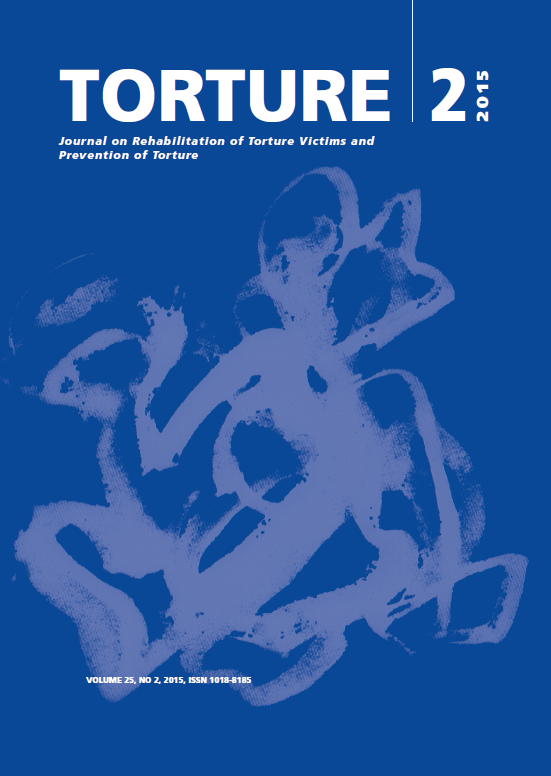Elusive retributive justice in post-Khmer Rouge Cambodia: Challenges of using ECCC Victim Information Forms as a victim participatory rights mechanism
DOI:
https://doi.org/10.7146/torture.v25i2.109667Keywords:
Posttraumatic Stress Disorder, depression, mental health, human rights, social recovery, Extraordinary Chambers in the Courts of Cambodia, Victim Information FormsAbstract
This paper focuses on the procedural challenges of using the Victim Information Forms (VIFs) to analyze survivors’ experiences with the Extraordinary Chambers in the Courts of Cambodia (ECCC), commonly known as the Khmer Rouge Tribunal. The paper takes a systematic public/medical sociology approach to examining the VIF as a participatory rights mechanism for victims wishing to pursue justice for themselves and their loved ones who experienced the Khmer Rouge atrocities, torture, forced relocation, starvation, forced labor, rape, robbery, and other physical and psychological torment, firsthand. It provides the first comparative, critical analysis of both the original VIF and the revised form issued midway through the submission period; both forms appear as appendices to the paper. Conclusions are drawn and suggestions made by the researcher based on the firsthand collection and submission of the largest group of VIFs from any single source around the world (outside of Cambodia itself), as well as on support work with victims/survivors during the ECCC proceedings in Phnom Penh, Cambodia in 2013.
References
2. Nou L. Beyond Silent Suffering and Trauma Half a World Away: Participation of Cambodian Diaspora Genocide Survivors in the Extraordinary Chambers in the Courts of Cambodia. Asia Pacific World. Berghahn Books; 2013 Mar 1;4(1):56–79.
3. International Justice Clinic, UCLA School of Law [Internet]. Los Angeles: University of California. 2010 June. Available from: http://www.cja. org/downloads/ECCC%20victims%20participation%20David%20Kaye%202009.pdf
4. Un K. The Khmer Rouge Tribunal: A Politically Compromised Search for Justice. The Journal of Asian Studies. Cambridge University Press (CUP); 2013 Oct 15;72(04):783–92.
5. Mohan M. The paradox of victim-centrism: victim participation at the Khmer Rouge Tribunal. International Criminal Law Review. Brill Academic Publishers; 2009 Dec 1;9(5):733–75.
6. Bonacker T, Form W, Pfeiffer D. Transitional justice and victim participation in Cambodia: A world polity perspective. Global Society. Informa UK; 2011 Jan;25(1):113–34.
7. Stensrud EE. New Dilemmas in Transitional Justice: Lessons from the Mixed Courts in Sierra Leone and Cambodia. Journal of Peace Research. SAGE Publications; 2009 Jan 1;46(1):5–15.
8. Yesberg K. Accessing justice through victim participation at the Khmer Rouge Tribunal. Law Rev. 2009;40(2):555–79.
9. McGonigle BN. Two for the price of one: attempts by the Extraordinary Chambers in the Courts of Cambodia to combine retributive and restorative justice principles. Leiden Journal of International Law. Cambridge University Press (CUP); 2009 Feb 4;22(01):127.
10. Rae JJ. War Crimes Accountability: Justice and reconciliation in Cambodia and East Timor? Global Change, Peace & Security. Informa UK; 2003 Jun;15(2):157–78.
11. Williams S. The Cambodian Extraordinary Chambers: A dangerous precedent for international justice? Int and Comp Law Q. 2004 Jan;53(1):227-45.
12. Mey E. Briefing paper: Cambodian diaspora communities in transitional justice. New York: International Center for Transitional Justice. 2008 Mar.
13. ECCC Practice Direction on Victim Participation. 2007. [Internet]. Available from: http://
www.eccc.gov.kh/ default/files/legal-documents/ PD_Victims_Participation_rev1_En.pdf
14. Blair RG. Risk Factors Associated with PTSD and Major Depression among Cambodian Refugees in Utah. Health & Social Work. Oxford University Press (OUP); 2000 Feb 1;25(1):23–30.
15. Bockers E, Stammel N, Knaevelsrud C. Reconciliation in Cambodia: Thirty Years After the Terror of the Khmer Rouge Regime. Torture. 2011;21(2):71–83.
16. Cheung P. Posttraumatic Stress Disorder Among Cambodian Refugees in New Zealand. Int J Soc Psychiatry. SAGE Publications; 1994 Mar 1;40(1):17–26.
17. Hinton DE, Chhean D, Pich V, Pollack MH, Orr SP, Pitman RK. Assessment of Posttraumatic Stress Disorder in Cambodian Refugees Using the Clinician-Administered PTSD Scale: Psychometric Properties and Symptom Severity. J Traumatic Stress. Wiley-Blackwell; 2006;19(3):405–9.
18. Fujii D, Yee BWK., Eap S, Kuoch T, Scully M. The neuropsychology of Cambodian Americans. In: Fujii D, editor. The neuropsychology of Asian Americans. New York (NY): Taylor & Francis; 2011. 11-27 p.
19. Hinton DE, Rasmussen A, Nou L, Pollack MH, Good M. Anger, PTSD, and the nuclear family: A study of Cambodian refugees. Social Science & Medicine. Elsevier BV; 2009 Nov;69(9):1387–94.
20. Marshall GN, Schell TL, Elliott MN, Berthold SM, Chun C. Mental health of Cambodian refugees two decades after resettlement in the United States. JAMA. American Medical Association (AMA); 2005 Aug 3;294(5):571.
21. Nou L. A qualitative examination of the psychosocial adjustment of Khmer refugees in three Massachusetts communities [Internet]. Occasional papers, Institute for Asian American Studies. Boston: University of Massachusetts. 2006. Available from: http://docs.lib.purdue.edu/cgi/ viewcontent.cgi?article=1001&context=jsaaea
22. Nou L. A sociological analysis of the psychosocial adaptation of Khmer refugees in Massachusetts. In Dalla RL, DeFrain J, Johnson J, Abbott DA, editors. Strengths and challenges of new immigrant families: Implications for research, theory, education, and service. Lexington (MA): Lexington Press; 2009. p. 33-51.
23. Stevens CA. Perspectives on the meanings of symptoms among Cambodian refugees. Journal of Sociology. SAGE Publications; 2001 Mar 1;37(1):81–98.
24. Gellman M. 2008. No justice, no peace? National reconciliation and local conflict resolution in Cambodia. Asian Perspective. 2008;32(2):37-57.
Downloads
Published
How to Cite
Issue
Section
License
We accept that some authors (e.g. government employees in some countries) are unable to transfer copyright. The Creative Commons Licence Attribution-NonCommercial-NoDerivatives 4.0 International (CC BY-NC-ND 4.0) covers both the Torture Journal and the IRCT web site. The publisher will not put any limitation on the personal freedom of the author to use material contained in the paper in other works which may be published, provided that acknowledgement is made to the original place of publication.


